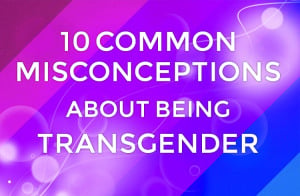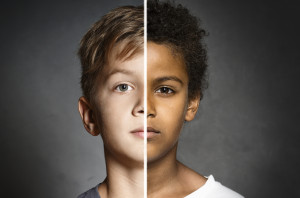Soon after I finished grad school, I began teaching sex ed at an after school program in the Bronx. The program was comprehensive in scope, but in a neighborhood with high rates of teen pregnancy, stress was placed on pregnancy prevention education as a goal of the curriculum.
Initially, I followed the loose curriculum I was given because I was new to the job, and it came from a respected source. But after a while, I started to question some of the lesson plans, since many fell into the typical trap of using fear and shame as a motivator, something that multiple studies have found simply never, ever work – and yet which are trotted out time and time again.
This wasn’t the program’s explicit intention, of course.
But what else were my students – some of whom were the children of teen parents and others who were teen parents themselves – to think when I warned just how poorly teen parents and their kids fared, or dropped grim stats about high rates of unemployment and low levels of high school graduation among this group?
How, I wondered, did they feel hearing yet another adult with no lived experience of their situations, discuss this topic in such bleak terms?
So I began to change the way I presented the material. And instead of solely portraying teen parenthood as a hard road to a hopeless future, I tried to begin the conversation on a positive note.
One way I did that was to invoke Stanley Ann Dunham.
A teen mom herself, Dunham went on to get a PhD in Anthropology and had an exciting career that took her all over the world. And her child? The one she had as a teen? He, I liked to tell my students, went on to become the 44th president of the United States.
Obviously, holding up a sitting president and his mother as examples of success isn’t the antidote to the teen parent shaming that goes on. But I found that doing so was a good way to set a supportive tone for the more complicated conversations and interventions to come.
But while changing the tone of the conversation is a crucial first step, there are a number of other things that adults who want to support young families can also be doing that can empower teen parents, while still acknowledging their unique and often challenging circumstances.
Here are four.
1. Allow Teen Parents Respect and Autonomy
My experience with the shaming of teen pregnancy and parenting was by no means unique.
It was only a few years ago that the New York City Department of Health rolled out an anti-teen pregnancy campaign that followed a pretty tired script.
The campaign showed a number of babies and toddlers, most of them crying or looking forlorn, alongside captions that read, “Dad, you’ll be paying to support me for the next 20 years.” Or “I’m twice as likely not to graduate high school because you had me as a teen.” And “Honestly, Mom, chances are he won’t stay with you. What happens to me?”
Similarly, the Candie’s Foundation has a long history of prominently promoting this kind of message.
For example, one of their campaigns included a series of posters that paired celebrities like Carly Rae Jepsen, Hilary Duff, and Lea Michelle with headlines admonishing, “You’re supposed to be changing the world, not diapers.”
Campaigns like these are following a long tradition of not only shaming teen parents, but of taking away a teen parent’s autonomy and treating them with disdain. Indeed, they ultimately represent a broader cultural understanding of teen parenthood as being a visible manifestation of a misdeed, and as such, not deserving of respect.
These days, more and more people are speaking out against such methods. Two of these are two teen moms named Gloria Malone and Natasha Vianna, who, along with a number of other young mothers, created the #NoTeenShame social media movement.
Offering tips for adults on how to be allies to teen parents – like asking adults to speak out against harmful media campaigns, fight stigma, and believe in the ability of young parents to make the best informed choices for their families – #NoTeenShame is giving voice to the people most affected by this issue.
This is important for a few reasons.
As Lauren Himiak of the reproductive rights organization Sea Change says, “Who knows best what young parents need? Young parents themselves! We all have the ability to be a supporter by actively listening – without judgment – to young families, celebrating their accomplishments and joy, and collectively working to shift the stigma surrounding young families.”
That’s something a lot of people need to work on, since many of us just assume that teen parents are raising kids as the result of having made bad choices, and so now can’t be trusted to make good ones when it comes to their families.
This isn’t the case – and challenging our internal script on the matter can make a big difference.
2. Provide Sex Education and Reproductive Health Care for Teen Parents
In addition to the shaming nature of most anti-teen pregnancy campaigns, such approaches typically leave out any information that could actually be useful – say, like conversations about STIs, safer sex, condoms, pregnancy options like abortion, or how to access reproductive health services.
And it’s not only media campaigns that take this dismal approach. We see this in classrooms across the country, where abstinence-only education continues to be taught, even in programs that are designed for pregnant and parenting teens! If there’s one thing that states with the highest teen birth rates all have in common, it’s that they all teach abstinence-only education.
And while birth rates vary between states, as a country, the United States has an incredibly high teen pregnancy and birth rate, with nearly one in five births to teens (ages 15 to 19) being a repeat birth.
But this isn’t surprising when we consider that we fail to provide sex education, put countless barriers in the way of accessing contraception, and then make it incredibly hard for anyone, and particularly for minors, to obtain abortions.
As it stands, about 11% of adolescents able to get pregnant in the United States will give birth by their twentieth birthday. A fair number of those young people will then be parents – parents who may still need good sex education and access to reproductive healthcare so that they can be best prepared to take care of their families.
We’ve a created a system that has a large role in producing teen parents. Yet we’re too busy blaming them when they don’t succeed to take stock of what about this system needs to change.
3. Give Teen Parents Access to Education (And the Childcare to Make That Possible)
Sex isn’t the only part of the education puzzle where we’re failing teen parents. For most teen parents, simply attending school at all can be really tough.
It’s true that some schools offer programs for parenting teens. The high school in my home district, for instance, had a program for parenting teens that, 25 years later, is still going strong.
But that’s only one program in one city – and a lot of parenting teens simply don’t have access to anything of the sort. When I asked my brother, a high school teacher with a lot of teen parents in his classes, what he saw as the biggest obstacle to those students’ success in school, he immediately said, “Not having childcare.”
The fact is, very few states make childcare available or affordable for teen parents. And without childcare, young parents – and particularly, the ones who gave birth – just won’t be able to go to class.
As the National Women’s Law Center (NWLC) explains:
“The good news is that with the right support and encouragement from their schools and communities, expectant and parenting students – and their children – can and will succeed. The bad news is that the supports are not there yet… Even when a parenting student has access to child care, too many states place limits on that care, such as requiring parents to work for a certain number of hours to receive support and placing limits on the amount of time parents can stay in school or the level of education they can obtain.”
That’s something teen mom Natasha Vianna knows all about. She explains that before she got pregnant, she was an honors student. Yet after her guidance counselor discovered her pregnancy, Natasha was moved into slower-paced classes and was dissuaded from applying to college with the admonishment that “girls like her” were lucky enough to make it through high school, let alone expect to go to college.
As she says, “The hardest obstacles I faced in high school were created by the adults around me.”
She explains, “Because of the ways in which American culture has depicted young parents in teen pregnancy prevention campaigns as irresponsible and immature failures, it really negatively impacts the way our educators see and treat us.”
Luckily, Natasha went to a school with a parenting student liaison, who ensured that the school would allow her to pump and who urged her guidance counselor to put her back into honors classes and helped her graduate on time.
But getting this help wasn’t easy, and a lot of parenting teens are forced to navigate these waters alone.
4. Help Teen Parents Understand Their Legal Rights
Teen parents may be minors, but their parenting status can give them different legal rights than their non-parenting peers.
In some states, a parenting teen is treated like an emancipated minor who can make their own decisions about things like healthcare and schooling. But in other places, parenting teens still need an adult to sign off on certain decisions.
What does not vary across state lines is a teen parent’s right to attend school.
Thanks to something called Title IX, no public school in any of the fifty states can kick teens out for being pregnant or parenting, as they are legally required to accept local students even if they’re parents.
Plus, any separate programs for pregnant or parenting students must be completely voluntary, and schools must excuse absences that are due to pregnancy or childbirth.
Still, despite this law, the situation is far from ideal.
According to the ACLU, teen parents across the US have similar experiences:
When they got pregnant or had a child, a principal, counselor, or teacher told them they’d have to leave school. In many cases, pregnant and parenting students are told outright that they can’t stay in school or must go to an alternative school, which all too often offer substandard educations. Sometimes the discrimination is more subtle. Schools refuse to give excused absences for doctor’s appointments, teachers refuse to allow make-up work, or staff members exclude them from school activities based on ‘morality’ codes or make disparaging, discouraging, and disapproving comments.
With all these factors in play, is it any wonder then that only 40% of teen mothers finish high school and that teen fathers are also far less likely to graduate than are their non parenting peers?
But it doesn’t have to be that way.
Adults can help teens navigate the complicated systems need to get things like childcare vouchers. They can help them fight for maternity leave, or against punitive school policies. Adults can speak up when they see a teen being dissuaded from going to college, and they can advocate on a teen’s behalf.
Doing so can achieve real results and also sends the message that the days of shaming teen parents and writing them off as unproductive members of society need to come to an end.
***
Being an adult ally to a parenting teen can feel tough since so often, what we want for teens and what they want for themselves can seem like they’re at odds.
But listening to what teen parents are asking for, and working to fight destructive stigma, doesn’t mean that we can’t offer guidance. All it means is that this guidance shouldn’t be colored by our preconceived notions about what it means to be a young parent.
For too long, teen parents have been treated as if they have made terrible, life-ruining mistakes. But chastising I told you so’s are never helpful. And if we truly want to help young parents and their children succeed, we need to weave them into our communities – not push them to the outskirts where they are so much more likely to falter.
[do_widget id=’text-101′]
Ellen Kate is a Contributing Writer for Everyday Feminism. She’s a health educator, sometimes writer, and mom. She has worked at Manhattan’s Museum of Sex, developed sex education curricula in Mumbai, India, and run HIV prevention programs for at-risk teens in the South Bronx. Currently, Ellen runs a middle and high school health education program and teaches human sexuality at Brooklyn College. More of Ellen’s writing can be found here. Follow her on Twitter @ellenkatef.
Search our 3000+ articles!
Read our articles about:
Our online racial justice training
Used by hundreds of universities, non-profits, and businesses.
Click to learn more





















